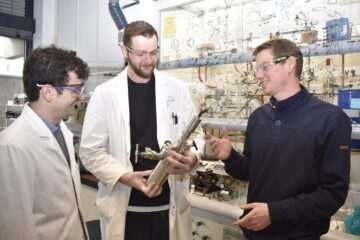New tuberculosis blood test in children is reliable and highly specific

The newly developed test (TAM-TB assay) is the first reliable immunodiagnostic assay to detect active tuberculosis in children. The test features excellent specificity, a similar sensitivity as culture tests in combination with speed of a blood test. The promising findings are a major advance for the diagnosis of tuberculosis in children, particularly in tuberculosis-endemic regions.
The study has been published on Sept 1st, 2014 in Lancet Infectious Diseases.
Tuberculosis (TB) in children is a serious public health problem especially in low-resource countries. About one million children per year develop tuberculosis worldwide. Unfortunately, the diagnosis of paediatric TB poses a major challenge. TB symptoms in children are often non-specific and similar to those of common paediatric illnesses, including pneumonia and malnutrition. Further, obtaining adequate respiratory specimens for direct mycobacterial confirmation is problematic. Consequently, there is an urgent need for a more precise, rapid and affordable diagnostic test for childhood tuberculosis.
The new so-called TAM-TB assay is a sputum-independent blood test. It makes use of an immunological phenomenon during tuberculosis disease: During an active infection, the expression of CD27 – a surface marker expressed on mycobacteria specific CD4+ T cells – is lost. Using standard intracellular cytokine staining procedures and polychromatic flow cytometry, the test result is available within 24 hours after blood sampling.
New blood test assessed in tuberculosis endemic regions in Tanzania
The new test was assessed in tuberculosis endemic regions in Tanzania at the Ifakara Health Institute and the NIMR Mbeya Medical Research Center. Sputum and blood samples were obtained from children with tuberculosis symptoms to compare the performance of the new assay with culture tests. For the assessment of the diagnostic performance of the new test, the children were assigned to standardized clinical case classifications based on microbiological and clinical findings. The test proved to have a good sensitivity and excellent specificity.
“This rapid and reliable test has the great potential to significantly improve the diagnosis of active tuberculosis in children ” says TB CHILD Program Manager Klaus Reither from the Swiss Tropical and Public Health Institute (Swiss TPH), who coordinated the study.
In a collaborative effort between Swiss TPH and Ludwigs-Maximilians-Universität München (LMU Munich), the test will now be further refined to optimise performance, particularly in HIV-infected children, and to reduce costs. The goal is to finally validate and implement a rapid, robust and accurate diagnostic test for active paediatric tuberculosis that can be used on the district level in resource-poor, tuberculosis-endemic countries.
The diagnostic assay was tested at the Ifakara Health Institute and the NIMR-Mbeya Medical Research Center in Tanzania coordinated by Klaus Reither from the Swiss Tropical and Public Health Institute (Swiss TPH) in collaboration with the clinical immunologists Claudia Daubenberger and Damien Portevin (both Swiss TPH), and Christof Geldmacher (LMU Munich).
The study was funded by European and Developing Countries Clinical Trials Partnership, German Federal Ministry of Education and Research, and Swiss National Science Foundation.
Study
Assessment of the novel T-cell activation marker–tuberculosis assay for diagnosis of active tuberculosis in children: a prospective proof-of-concept study. Damien Portevin, Felicien Moukambi, Petra Clowes, Asli Bauer, Mkunde Chachage, Nyanda E Ntinginya, Elirehema Mfinanga, Khadija Said, Frederick Haraka, Andrea Rachow, Elmar Saathoff, Maximilian Mpina, Levan Jugheli, Fred Lwilla, Ben J Marais, Michael Hoelscher, Claudia Daubenberger, Klaus Reither, Christof Geldmacher. Published online, Sept 1 2014, http://dx.doi.org/10.1016/S1473-3099(14)70884-9
Contact
Klaus Reither, Swiss Tropical and Public Health Institute
Klaus.Reither@unibas.ch, Tel +41 61 284 89 67
About the Swiss Tropical and Public Health Institute (Swiss TPH)
The Swiss Tropical and Public Health Institute (Swiss TPH) is one of Switzerland's leading public and global health institutions. Associated with the University of Basel, the institute combines research, teaching and service provisions at local, national and international level. Swiss TPH is a public sector organisation and receives around 18% of its budget of approximately 80 million francs from core contributions from the cantons of Basel-Stadt and Basel-Landschaft (10%) and from the federal government (8%). The remainder (82%) is acquired by competing for funds. The Institute has more than 600 employees working in 20 countries.
Media Contact
All latest news from the category: Health and Medicine
This subject area encompasses research and studies in the field of human medicine.
Among the wide-ranging list of topics covered here are anesthesiology, anatomy, surgery, human genetics, hygiene and environmental medicine, internal medicine, neurology, pharmacology, physiology, urology and dental medicine.
Newest articles

Lower dose of mpox vaccine is safe
… and generates six-week antibody response equivalent to standard regimen. Study highlights need for defined markers of mpox immunity to inform public health use. A dose-sparing intradermal mpox vaccination regimen…

Efficient, sustainable and cost-effective hybrid energy storage system for modern power grids
EU project HyFlow: Over three years of research, the consortium of the EU project HyFlow has successfully developed a highly efficient, sustainable, and cost-effective hybrid energy storage system (HESS) that…

Safer alternative for an explosive reaction
The chemical industry has been using a reaction with explosive chemicals for over 100 years – now Mülheim scientists have discovered a safer alternative. The Ritter Group of the Max…





















